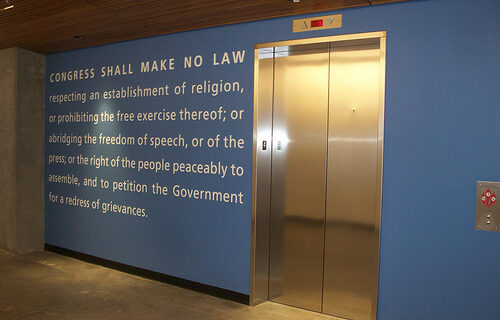Last week, the Supreme Court of the United States unanimously held that religious organizations could practice discrimination in their employment practices. I’ll admit that the previous summary was extremely terse and doesn’t deal with any of the nuances of the case, but it’s not any more terse than referring to the controversial and wrong-headed split decision on “Citizens United” as the day the Court determined that corporations are people.
There are some good points made in the article, but I have a couple of issues with it as well. First, the article rightly decries those who use religion for their own ends and shares a fear that our current situation negatively impacts both the image and the finances of religious institutions. But, is changing our laws truly a good prescription for this situation? The First Amendment is very clear that “Congress shall make no law respecting an establishment of religion,” and is that really something that should be changed, without regard to its impact on ALL religions practiced in this country? There is a significant amount of protection for religious freedom embedded in that amendment, and I’m not so sure that the potential benefit for dropping this comes remotely close to the potential for damage – especially when considering minority (non – “Christian”) religions. I’m also not very comfortable with the idea that positions on religious issues should lead to legislation. I’ll admit to, as a principle, being against abortion, but I am outright opposed to the evils that come with making such opposition a law, rather than a moral precept. Issues like that, not to mention the move to legally decide who can marry who, leave me VERY uncomfortable with the idea of changing laws in order to make the church-state relationship “work better.”
The more serious issue I have with this perspective, however, comes from my belief that religion has to stand or fail on its own merits. Even without a First Amendment, I’m going to believe as I choose. If religion is failing, falling into disrepute, or otherwise having problems, those solutions need to come from within the religious community itself. I’ll go a bit further: when I look at the state of faith communities and religion in general, I do see a lot of people and organizations clinging to what they have with an increasing sense of desperation. I also see a lot of people and organizations determined to resist change and progress, even when it means their extinction. We have created this static sense of faith as unchanging and unchangeable, and when we run into a situation where things are not the way we like them, we STILL have this tendency to want to shape the world (or in this case, its laws) to fit our perceptions, rather than change those perceptions. For all that, some denominations say things like “God is still speaking.” And we have an endless supply of people who reply “but God better not say anything new around here.” If we truly fear being “irrelevant,” why are we not pushing to reinvent ourselves; adapt; and become more relevant? Why do we, as the article would suggest, fear others getting a piece of our money pie to the extent that we are willing to change the Constitution? I always thought that having a faith meant standing for something, regardless of what everyone else is doing. Sure, having laws that protect my right to do that makes it more convenient, but I’m not about to ask others to give up their freedoms because that “convenience” is no longer working out to my advantage.
So that’s pretty much my bottom line. If religion is taking a beating because things aren’t as easy as they once were, and we are facing increased competition and problems, bring ‘em on! Those things that are worthy of survival will do so, and I think that they can accomplish this without excessive political change. Besides, who is to say that religion, as a concept, is what we need today, anyhow. This case brings to mind a button I used to wear: “God favors no person or group. Only religions do that.” The Supreme Court has ruled, unanimously, that religions can do what religions do. If you have a problem with that, don’t change the laws. Change your faith. Or, better still, bring together others and change the nature of faith in our society. We will all be a lot better off.
by David Adams


Follow Us!